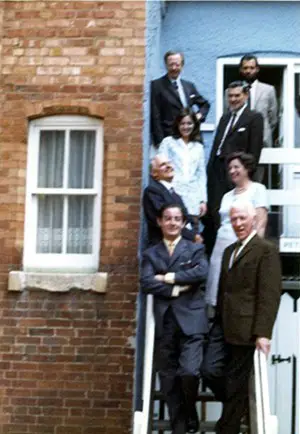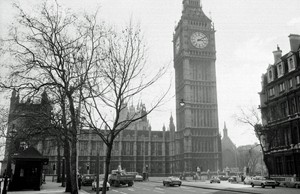How much did people earn in the 1970s? - UK

Wages increased significantly for most jobs in the 1970s. Price also rose, but people were still better off in 1979 than they were in 1970.
The average weekly wage in 1970 was £18.37, in 1979 it was £68.92. The 1979 wage in 1970 money was £23.79. An increase of 30%.
Unemployment went up in the 1970s. In the middle years of the decade many school leavers found it difficult to get a job.
Manual occupations

Rates of pay for male manual workers improved in the 1970s.
- 1970 - average male manual wage age 21 and over - £26 16s per week (£1,394 pa)
- 1979 - average male manual wage age 21 and over - £93 per week (£4,836 pa)
Source: New Earnings Survey (NES) time-series of gross weekly earnings from 1938 to 2017, published by the Office for National Statistics
Although inflation took a big chunk of the spending power, rates of pay went up by a factor of 3, prices were 2.6 times higher in 1978 than in 1970.
Women doing manual jobs were paid lot less:
- 1970 - average female manual wage age 18 and over - £13 8s per week (£696 pa)
- 1979 - average female manual wage age 18 and over - £55.2 per week (£2,870 pa)
Source: New Earnings Survey (NES) time-series of gross weekly earnings from 1938 to 2017, published by the Office for National Statistics
Non-manual occupations
Both men and women earned more in non-manual (white-collar) jobs.
- 1970 - average male non-manual wage age 21 and over - £35 16s per week (£1,861 pa)
- 1979 - average male non-manual wage age 21 and over - £113 per week (£5,876 pa)
Source: New Earnings Survey (NES) time-series of gross weekly earnings from 1938 to 2017, published by the Office for National Statistics
- 1970 - average female non-manual wage age 18 and over - £16 16s per week (£873 pa)
- 1979 - average female non-manual wage age 18 and over - £66 per week (£3,432 pa)
Source: New Earnings Survey (NES) time-series of gross weekly earnings from 1938 to 2017, published by the Office for National Statistics
The gap between non-manual and manual wages declined in the 1970s. The gap between women's and men's earnings (in percentage terms) also closed a bit. Women ended the decade still well behind men.
School leavers
On 1 September 1972, the school leaving age was raised from 15 to 16. Children did GCEs and CSEs in their final year at school. Less academic pupils could leave earlier if they were 16.
In 1970, you could join the Post Office as a clerical officer at age 16 and earn £575 pa. You could also join as a postman at age 15. The Post Office recruited far fewer postwomen. In London the starting wage for postmen was £9 16s per week. In the same year Prudential offered jobs for school leavers with GCE O or A levels starting at £675 pa.
If they wanted something more active, boys could join the Army on leaving school and earn £17 7s if they were prepared to sign up for nine years.
By the middle of the 1970s things were looking much bleaker for 16 year old school leavers. In 1975 one in four school leavers in London did not find a job. [1]
Armed services
- 1977 - Private soldier - £55.75 per week
- 1977 - Second lieutenant - £60 per week
Source: Hansard HC Deb 09 December 1977 vol 940 cc1858-949
Teachers
- 1971 - basic salary - £980-£1720 pa
- 1974 - top salary for head teacher - £6,456 pa
- 1974 - senior university lecturer - £4,707-£5,976 pa
Teachers' pay had fallen behind that of other occupations in the 1970s. In 1973, it took ten years for a teacher starting out to reach the average manual worker's pay. Teachers gave up hope of ever reaching the average clerical salary. [3]
In 1974, the Houghton Report by Labour MP Arthur Houghton recommended a huge pay increase for teachers. Teachers got the recommended salary increase the following year.
Footballers
The days of enormous wages for footballers started in the 1970s. In 1979, Trevor Francis received a share of a record £1m transfer fee from Birmingham City to Nottingham Forest. At Forest he received wages of £1,000 per week. [4]
Police
In 1979 police constables earned up to £5,700 in the provinces and £6,669 in London from aged twenty-two. They also got a generous housing allowance or a rent-free police house.
What were the best paid jobs?
The highest paid executive of the 1970s was Richard Tompkins, the Chairman of the Green Shield Stamp Company. In 1971, he was entitled to £395,000, but he waived £135,000 of his pay.
In 1979, Norman Castle, the Chairman of S & W Berisford, received a salary of £272,672.
Source: The Guinness Book of Records, 1980 page 234

Image by Leonard Bentley licensed under Attribution-ShareAlike 2.0 Generic (CC BY-SA 2.0).
Politicians
In 1970 MPs were paid £3,250. In 1972 their salary increased to £4,500. By 1979 MPs were paid £9,450.
Source: 'Members' pay and allowances - a brief history', by Richard Kelly
What did other jobs earn?
This is a selection of jobs that were advertised in the national press in the 1970s.
- Engineering or navigation officer for Shell Tankers (1970) - £3,000 - £5,000 pa
- RAF technician with one year's experience (1970) - £22 15s per week
- London bus driver (1973) - £37.50 per week (including overtime)
- Postman in London area (1970) - £20 16s per week
- Postman in London area (1975) - £46.96 per week
- Prison officer (1971) - £20.89 to £28.48 per week
- Sailor in the Royal Navy (1973) - £24 per week at age 18
- Traffic warden (1973) - £27.10 per week
- International telephonist (male) (1973) - £27.60 per week
- Typist at the Department of Trade and Industry (London) (1973) - £24.05-£26.05 per week
- Double glazing salesman (Alpine Double Glazing) (1975) - up to £10,000 pa
- Coach trimmer and finisher at Leyland cars (1977) - £69.30 per week
- Production worker at Ford (1978) - £68 per week
References
[1] 'On the dole' by Richard Sear, published in The Daily Mirror, 12 August 1975, page 5
[2] 'Top of the form', published in the Daily Express, 27 May 1974, page 2
[3] 'Ammunition for teachers in salary talks' by John Ezard, published in The Guardian, 27 November 1973, page 6
[4] 'Francis pay freeze' by Joe Melling, published in the Daily Express, 24 August 1979
By Steven Braggs, January 2022


Comments
In 1970 at the age of 14 I started a plumbing apprenticeship my first weekly wage was £4-6shillings
I was 15 in 1972 & worked in a mill. 1st wage was £5, no tax. was still on kids wage after marriage at 17.Equality Act didnt work unless you did same job as a man. My job was from a y a man retiring, earning 3 Xs my wage. It was a very dangerous place to work.
In 1976 at 22 years of age I was earning £25 per week, my dad earned £33 per week
tax was 35p in the £